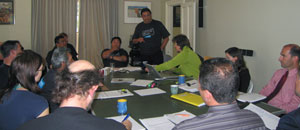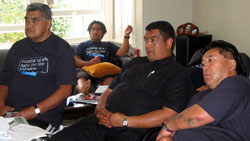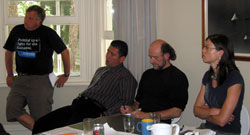| Hui
Report
Hokianga Accord Working Group
Page 2

(PDF
90Kb)
Hui
Focus
Ministry was keen
to engage with non-commercial fishers on a number of other
issues, in addition to allocation.
Other relevant issues
include TACC settings, planning and spatial management including
use of Part IX [of the Fisheries Act] tools.
While allocation
is a very important issue there are 25 policy projects underway
in Mark's team, some of which would be of significance to
all fishing interests including non-commercial fishers such
as |
|
allocation in the Oceans
context and the Marine Reserves Bill, the role of various biodiversity
protection tools and how the interests of fisheries stakeholders
are recognised in achieving those biodiversity protection interests.
Fisheries stakeholders,
including non-commercial, would be interested in being involved
in the process to determine the final form of legislation to achieve
those objectives and the process that is used to implement
them.
Crown
Maori Relationship
With the Treaty of Waitangi
(Fisheries Claims) Settlement Act 1992 and Fisheries Act 1996 MFish
has obligations to tangata whenua but there seems to be some inconsistencies.
The nature of the relationship is already established and formalising
the relationship with iwi should be a fairly simple process.
Sonny had mentioned previously
that Ngapuhi had never been asked to have "input and participation"
into sustainability measures or MFish processes since the introduction
of the Quota Management System (QMS) in 1986. Now was a good time
to start providing for that statutory obligation.
Ministry agreed with this
assessment and advised that the Crown Maori Relationship Instrument
(CMRI) framework that they work with is generic across Government
departments, across a range of issues. MFish are willing to discuss
tangata whenua's concerns about the particular MOU provided by Ministry
if that was required.
Input
and Participation
Considering the five year
development process of the MOU between MFish and Tainui it was a
concern that Ministry would focus the effort of both MFish and tangata
whenua on the MOU for the Hokianga Accord and divert attention away
from the Minister's existing obligations under section 12 of the
Fisheries Act 1996. Section 12 specifies the Minister has to provide
for the "input and participation" of tangata whenua having a non-commercial
interest in the stock or an interest in the effects of fishing on
the aquatic environment in the area concerned.
Ministry agreed that the
obligation on the Minister to provide for the "input and participation"
of tangata whenua into sustainability measures was "black and
white" in the Act. For other fisheries management processes
Mark Edwards made the comment that MFish and tangata whenua would
probably not agree, at this stage, what that meant.
MFish consider there needs
to be a lot of discussion to determine how and what process is used
to provide for the section 12 obligations, within their available
resources. The needs of tangata whenua would be different for a
sustainability measure for a shellfish bed decision compared to
the requirements of being involved in developing the Oceans policy.
Ministry were asked to clarify
their definition of "tangata whenua having a non-commercial interest"
as referred to in section 12 (1) (b) of the Fisheries Act 1996.
Mark's reply was, " our understanding, and it hinges around
the customary regulations, is the non-commercial interest would
be where they wish to take seafood for use and consumption that
is not for the purposes of pecuniary gain or trade."
The Treaty of Waitangi (Fisheries Claims) Settlement Act specifically
provides for tangata whenua's non-commercial customary interest.
Maori recreational fishing interests are catered for within the
Fisheries Act 1996 section 21.
MFish pointed out that the
Forums could address other interests such as recreational, commercial
and environmental interests.
 |
Tainui
MOU
Tainui representative
Tom Moana made the trip from Ngaruwahia to support Sonny,
Ngapuhi and the other northern iwi involved in the Hokianga
Accord.
He raised the issue
of their MOU that had been underway with MFish for over
five years. |
Being a document of only
one and half pages he struggled to understand the delay in addressing
the outstanding issues. His main point was to encourage MFish to
talk with iwi first and foremost before consulting with Te Ohu Kai
Moana (TOKM) on matters that affect Maori non-commercial fishing
interests. TOKM certainly do not speak for iwi on non-commercial
fisheries matters.
MFish
MOU
The day before the hui
the Ministry had sent through a paper titled 'Parameters for Ministry
of Fisheries Engagement on Terms of Reference and Memorandum of
Understanding with the Hokianga Accord' (Appendix
One).
The Hokianga Accord Working
Group had not had time to consider this paper in any detail so asked
the Ministry representatives to work through the paper, section
by section and explain their logic.
The Ministry explained the
constraints placed on them by legislation and Government policy.
MFish were adamant they have always recognised most fishing by Maori
is done under the amateur fishing regulations but have not specifically
stated this fact.
MFish gave a list of items
that could be included in the Terms of Reference (TOR) for the parties
to the Hokianga Accord. Ministry do not see themselves as a signatory
to the Hokianga Accord. The MOU is a more general document that
covers the relationship between the Forum and Ministry. The Crown
Maori Relationship Instrument was also discussed in the MFish paper.
In the paper the Ministry
commented on specific sections from the draft Kaupapa Whakahaere
developed by the Hokianga Accord.
Ministry envisage involving
the Forum in the development of fisheries management proposal documents
before they are written and sent out to stakeholders for input in
order to meet their obligation to provide for the "input and participation"
of tangata whenua.
Fisheries
Management
MFish have four sustainability
processes per annum and they are currently considering the April
2006 sustainability round. MFish determine what resources they have
available and work out a priority list to assist them in deciding
what fisheries should be reviewed. Ministry plan to consult with
the regional Forums to determine what their priorities are for each
round and give tangata whenua the opportunity to have input at that
stage.
MFish are looking to improve
their consultation processes to take into account the needs of Maori.
Ideally this would include early notice of proposals to allow for
Maori to gather the mandate, participate and get involved in the
research planning process. Ministry are developing a monthly bulletin
to advise the Forums of upcoming issues.
Fisheries
Plans
Fisheries Plans
are viewed by Ministry as the long term solution to the
reactive style process currently operating where submissions
are written in response to MFish proposals.
On consultation
with other non-commercial fishing interests the Minister
said last year that he wanted to establish a national advisory
body to advise him on strategic issues. |
|
Mark went on to explain,
" that is focused on allocation. The whole reason why the Minister
wanted to develop a high level relationship with that other non-commercial
sector was to progress this allocation issue. That is what is at
the heart of the strategic issues that we need to address. We know
how critical it is to that sector. But he also needed another way
to engage with recreational fishers that have much more local, regional
interest in fisheries and engage in existing statutory process.
They fulfil a different statutory obligation than what we are trying
to achieve through the iwi regional Forums".
TOP
Statement
of Intent
The draft MFish Statement
of Intent is due to be released before or not long after Xmas. This
document would be presented to the next Forum hui for discussion
and input. MFish were asked when tangata whenua would be provided
their opportunity to have "input and participation" into this process.
Terry Lynch responded, " we need to be quite clear about the
legal duty of what "input and participation" is, it is only matters
to do with sustainability of fisheries. It's not to do with the
other business activities of the Ministry".
Fisheries
At or Above BMSY
Ministry are not clear where
the current Minister stands on David Benson-Pope's July announcement
about managing fisheries of importance above Bmsy or significantly
above Bmsy [1] . MFish are
waiting to see if Jim Anderton will endorse several of Mr Benson-Pope's
policy statements. In the meantime section 13 of the Fisheries Act
provides for the management of fisheries at or above a level that
can produce the Maximum Sustainable Yield.
 |
Iwi
Forums
Original MFish
plans were for two meetings in the first year of a Forum's
existence, four and six meetings for the second and third
years respectively. Ministry also expected the attendance
of only five staff per Forum meeting.
The Ministry have
been "over delivering" to the four Forums established to
date and also recognise that four meetings in the first
year is more realistic. |
The $20,000 MFish funding
only provides for hui costs and some transport costs for tangata
whenua to attend the meeting. The $20,000 is ongoing funding.
Ministry do not envisage
providing funding to Forums to engage independent advice on fisheries
management matters. MFish have offered the Extension Service Officers
as assistants for developing Fisheries Plans and attending to other
issues of importance to the Forum.
According to the Forum's
definition of section 12 (1) (b) of the Fisheries Act all sustainability
measures approved by the Minister since the passing of the 1996
Act is illegal because for eight years the Minister has failed to
"provide for the input and participation of tangata whenua". Therefore
those processes are illegitimate.
There was plenty of discussion
about who would be involved in the Hokianga Accord. The Ministry
were advised that the only formal parties to the Forum would be
tangata whenua. The involvement of other non-commercial recreational
fishing interests was irrelevant to MFish. Ministry were concerned
that their obligation was to tangata whenua according to the CMRI
policy.
Alternative
Model
The four regional
iwi Forums in existence have been established using the
MFish model managed by the Customary Relationship Unit (Te
Tari o te Kahui Pou Hononga).
An alternative
relationship model was presented to the Ministry for their
consideration and feedback. (Appendix
Two).
The draft alternative
has iwi as the focal point of contact with MFish. |
|
| Other iwi including Te Rarawa, Ngati Wai and
Ngati Whatua are yet to decide their position on being parties
to the Hokianga Accord and could conceivably fit into this
alternative model, with their own formal arrangement with
the Ministry. |
 |
MFish
expressed some favourable feedback on the model's ability
to provide a formal relationship
with a mandated body, but they would have some reservations
about signing an MOU with each iwi.
They would be
looking to have an agreement with a collective of iwi.
Mark Edwards reminded
the hui that they have existing relationships with other
fishing interests and |
| could possibly have more connections
between MFish and parties to the Hokianga Accord than was
depicted in thealternative model. The hui accepted this. |
Mark advised that they
would need to talk with others in Wellington including Te Puni Kokiri
( TPK) about the alternative model and provide some feedback.
Sonny then spoke about
the Electoral College established under the Maori Fisheries Act
2004 as perhaps a model to look at when considering clusters of
iwi to engage in formal MOU with the Ministry. Ngapuhi, as the overwhelmingly
largest iwi in the country, stood on its own by virtue of its huge
population. Other recognised iwi throughout the north were clustered
together under one umbrella and population wise, did not match Ngapuhi's
numbers, even combined. It was therefore proposed that this model
be investigated by the Ministry for its suitability.
Conclusion
Both MFish and the Hokianga
Accord Working Group agreed the allocation of fisheries resources
is the primary issue that needs to be addressed. The Working Group
does not believe non-commercial fishing interests would be served
well if the Hokianga Accord diverted its attention and resources
into developing fisheries plans or local management regimes.
The Intersectorial Allocation
Policy being developed by the Ministry and the ensuing process would
need to be monitored and have meaningful input from the Forum.
MFish and the Working Group
agreed to give due consideration to the discussions held during
the day in relation to the MFish MOU explanation and the Accord's
draft Kaupapa Whakahaere.
Clarification of tangata
whenua's 'non-commercial interest', as specified in the Fisheries
Act section 12 (1) (b) is still required. MFish's understanding
is it "hinges" on the customary regulations. The Working Group has
some doubts whether it only refers to customary fishing and could
extend beyond this to include recreational fishing and other interests.
The opportunity to receive
and respond to MFish's priority list of sustainability measures
was welcomed. The Forum look forward to receiving the Ministry's
monthly bulletin advising of upcoming management issues.
The Draft 2006/07 Statement
of Intent due to be released around Christmas will need to be reviewed
and ideally the Forum would provide some feedback to MFish within
the three month consultation period.
Interest is high amongst
Hokianga Accord participants on whether Jim Anderton would endorse
the previous fisheries Minister's policy of managing important recreational
fisheries above or significantly above Bmsy. If endorsed, how the
policy is given effect would need to be monitored and commented
on.
Ministry committed to providing
some feedback on the alternative relationship model presented during
the hui. No timeframe was mentioned but the Forum would expect some
feedback before or at the next hui of the Hokianga Accord.
The next full Forum meeting
is due for early March 2006, date to be confirmed.
[1]
" That species important to recreational fishers should be
managed above, or even significantly above, what fisheries documents
refer to as BMSY – the size of a fish stock that delivers
the maximum sustainable yield." David Benson-Pope, 8 July 2005 -
NZ Rec Fishing Council AGM and Conference.
TOP |





